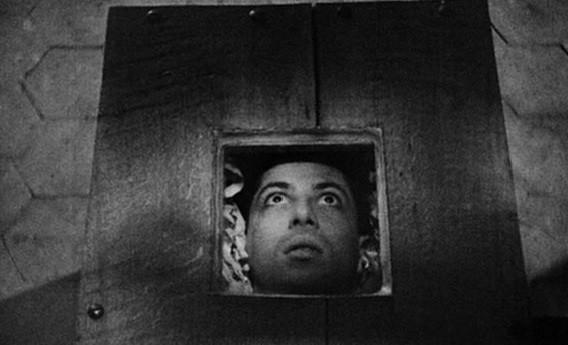For this review, I'm simply going to describe the characters.
- The countess is a complicated character. She initially seems sympathetic, with a strong desire to be a normal woman again. As she goes about trying to become human, she is selfish and petulant, putting the lives of others at risk and become annoyed when her will is not obeyed. She is a manipulator. Yet, she genuinely does want to stop killing others and to be normal; her urgency is in earnest.
- Sandor is a foil to the Countess. While she wants to be a human, he wants to be immortal. It's kind of amusing how he foreshadows the goth subculture of hte '80s, with his greased-black hair, dark lipstick, thick eyeliner, all black clothing, and general talk about 'death' and 'darkness'. The actor is actually a rather handsome fellow, but he's damn creepy as Sandor, particularly when he's introduced at the burning of Dracula's body on this lovely, foggy, chiarascuro studio set. His hopes and dreams are dependent on the Countess not achieving hers, which is a source of much dramatic tension. If she becomes human, he can never be immortal. But since she despises being a vampire, she certainly has no interest in bestowing it on others. He never acts against the countess until the end, but is always pleased when she fails at her goals to be human and tries to discourage her.
- Dracula is an invisible character in the film. The Countess blames all of her troubles on Dracula. She describes it as a voice with such power that it overcomes the grave to call out to her, commanding her to do what she does. Kind of the way Imhotep controls Zita Johanne in The Mummy. The gives way to some discussion about the power of the will. She thought burning Dracula's corpse would free her, but Dracula's spirit lingers, so she seeks to aid of science, hoping it's some sort of hypnotic spell that can be cured.
- Dr. Garth is the doctor to whom the Countess turns for help, and also a friend of Dr. Van Helsing's. Initially her interest in him is as a man of science who can be of service, but soon she's overcome with lust and wants to make him immortal. Her desires are what drive her back to the dark side; she ceases to care about being human. The dark side of love, I suppose? Or childish desire? It seems more juvenile than romantic. At any rate, Dr. Garth is an unusual character for the lead. He is plainly a grumpy man, if very professional. I mean, he makes Harrison Ford's characters seem downright cheerful. He likes things to go very smoothly and is annoyed at the slightest wrinkle in his plans. Like most men of this sort, he is stubborn, won't back down, and a bit volcanic with his temper. Anyway, he has two women in his life now: the Countess and his immature secretary, Esme, who is the daughter of a Baron. While he's lured to the countess for her exoticism, need for him (he likes to feel strong and needed--which is why he resents Esme so much), and apparent maturity, his sparring with Esme is clearly loaded with sexual tension and he cares about her. He's also very dependent on her for just about everything, much to his chagrin. He's a bit of a wanker if you ask me.
- Esme is the well-educated daughter of a Baron who, while unable to get a professional job of her own at the time, is employed as secretary to the doctor. Most of her time is spent locking antlers with him, as she tries to show she's independent and strong and to get his attention. Sadly, he doesn't respect her very much and seems to wish she'd be more dependent on him. The irony is that he can't tie his own tie without her. She's clearly jealous of the Countess' presence in the doctor's life and tries her bestest to get rid of her, until the Countess kidnaps her, forcing the doctor to choose. Funny thing is, the doctor doesn't get to choose. Sandor does that for him. She's pretty much the polar opposite of Sandor, urging the doctor, in her misguided way, towards good.
- Van Helsing, played by the great Edward Van Sloan again, is being tried for the murder of Dracula and Renfield, so he's of very little help in the film. It is more or less structured so that the events involving the Countess serve to exonerate Van Helsing of the murder charge. He's not directly involved in the proceedings.
So there you have it. Dracula's Daughter is very much a character-based story. If you get the psychology of, parallels and relationships between these characters, you see you have a pretty strong and fascinating film on your hands.
Help make this site more interesting through discussion:
Dracula's Daughter (1936)
Author: Jared Roberts
Subscribe to:
Post Comments (Atom)


0 comments:
Post a Comment